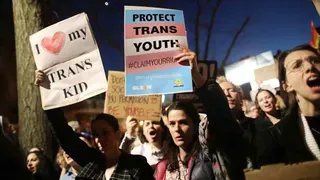May 18, 2017
Vaccine May Cut HPV Infections , An Oral Cancer Risk in Men
Marilynn Marchione READ TIME: 4 MIN.
The HPV vaccine that helps prevent cervical cancer in women also might lower the risk in young men of oral infections that can cause mouth and throat cancers, a new study finds.
These cancers are rising fast, especially in men, and research suggests that HPV, the human papillomavirus, is spreading through oral sex. The actor Michael Douglas brought attention to this risk several years ago when he blamed his cancer on it.
This is the first study of whether the vaccine might prevent oral HPV infections in young men, and the results suggest it can. No men who had received at least one dose were later found to have infections of HPV strains linked to cancer, but more than 2 percent of unvaccinated men had them.
"There may be additional benefits to vaccinating your son or daughter" besides the problems the vaccine already is known to prevent, said Dr. Maura Gillison of the University of Texas MD Anderson Cancer Center.
Results were released Wednesday by the American Society of Clinical Oncology ahead of presentation at its annual meeting next month.
THE VIRUS
HPV is very common - most sexually active people have been exposed to it. Some types cause genital warts. Usually, the virus causes no symptoms and goes away, but some people develop long-lasting infections of strains that can cause cancer.
The vaccine was approved in 2006 to prevent cervical cancers in women, and later, for some others including anal cancer in men. But acceptance has been slow - only about half of those eligible are getting it now, according to the latest information.
Now, awareness is growing of HPV's other risks - oral infections are blamed for 70 percent of cancers in the mouth and back of the throat. About 11,600 of these occur each year in the U.S. and rates are rising 5 percent per year. They're four times more common in men than women.
There are now more mouth and throat cancers caused by HPV in the U.S. each year than there are cervical cancers.
Oral sex is the main risk factor for getting an HPV infection in the mouth or throat, Gillison said. While "oral sex does not give you cancer," the infection in rare cases can develop into cancer over many years, she explained.
THE STUDY
She led the study, funded by the National Cancer Institute , while previously at Ohio State University. Researchers interviewed 2,627 men and women ages 18 to 33 years in a national health study from 2011 to 2014 about whether they had been vaccinated, and tested oral rinse samples from them for HPV.
Infections with worrisome HPV strains were found in far fewer people who had received any shots - an 88 percent lower risk. The results in men were striking - no infections in the vaccinated group versus 2.13 percent of the others.
The study was observational, so it can't prove the vaccine was responsible. But it may no longer be ethical to do an experiment where one group gets no vaccine, because its benefits for preventing other cancers is known. It might be possible to do such a study in people over 26, the age limit now for HPV vaccination, Gillison said. If a benefit were shown, it might lead to expanding the group for whom the vaccine is recommended.
The bottom line is that the vaccine helps, and "so few people who should be getting it are," said Dr. Richard Schilsky, chief medical officer of the oncology society who had no role in the study.
WHAT PATIENTS SAY
Scott Courville wishes it existed when he was young. The 43-year-old construction inspector from St. Martinville, Louisiana, was treated last year for HPV-related tonsil cancer that spread to lymph nodes.
"I went through 33 rounds of radiation and six rounds of chemotherapy," lost 100 pounds, and now has damaged taste buds and sinuses, and constant ringing in his ears, he said.
His three teenaged sons and stepsons are getting the vaccine.
"There was no question at all" that they would, only how soon, he said.
Tom Jackson also had an HPV-related tonsil cancer, found in 2013, and works to fight stigma over an infection that is largely sexually spread.
As a school board trustee in Houston, "I believe strongly that all children should receive all vaccinations," Jackson said. "The horror of HPV cancer is tremendous," and not to be "whitewashed" by squeamishness or reluctance to discuss prevention, he said.
THE VACCINES
The vaccines are recommended mostly for young people, ideally before they're exposed to HPV.
Merck's Gardasil is approved in the U.S. for females 9 through 26 to prevent cervical, vulvar, vaginal and anal cancers and genital warts. For males ages 9 through 26, it's approved for preventing anal cancer and genital warts. A newer version of Gardasil that includes more HPV virus types is approved for males 9 through 15.
GlaxoSmithKline's Cervarix vaccine is approved for females 9 through 25 to prevent cervical cancer.
All require two or three shots, depending on age.
Other ways to help prevent oral HPV infections are limiting the number of sex partners and not smoking. Condoms or dental dams may help.
Signs and symptoms of mouth and throat cancers may include a long-lasting sore throat, earaches, hoarseness, enlarged lymph nodes and pain when swallowing.







